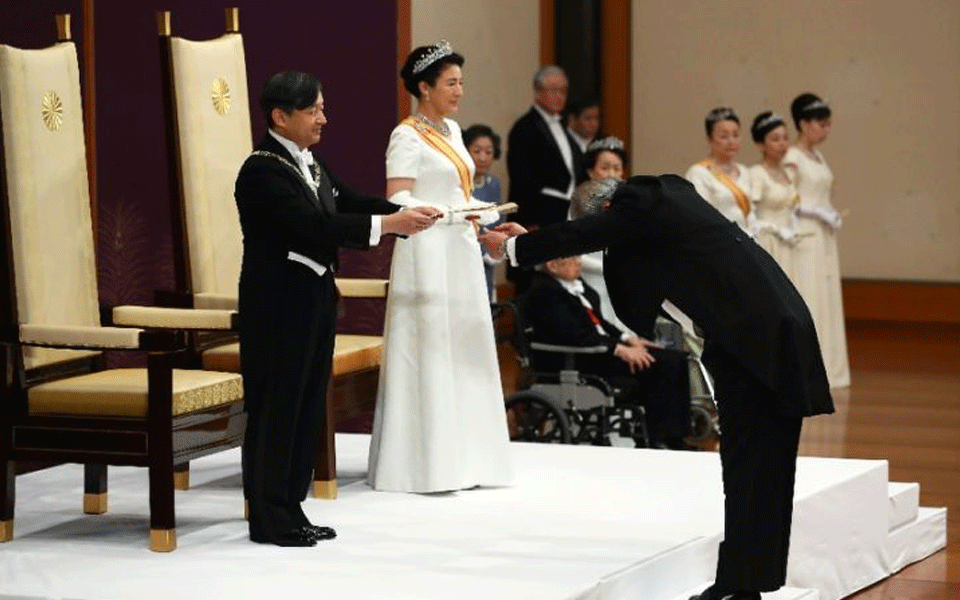Tokyo: Japan's new Emperor Naruhito formally ascended the Chrysanthemum Throne on Wednesday, a day after his father abdicated from the world's oldest monarchy and ushered in a new imperial era.
Naruhito officially became emperor at the stroke of midnight but the process was formalised with a 10-minute ritual on Wednesday morning that was off-limits to female royals -- even his wife Masako.
It took place on the first day of the new imperial era of Reiwa, meaning "beautiful harmony", which will last throughout Naruhito's reign. At a solemn ceremony in the Imperial Palace's Room of Pine, the 59-year-old was presented with the items his father Akihito relinquished a day earlier: sacred imperial treasures of a sword and a jewel, as well as the seal of state and his personal imperial seal.
The sole woman allowed to attend was the only female member of Prime Minister Shinzo Abe's cabinet. Shortly afterwards, joined by Masako and other royals, Naruhito was to address the nation for the first time as its 126th emperor.
He will also make a public appearance on Saturday when he will again speak to the people of Japan. But the pomp and ceremony will wait until October 22 when he and Masako will appear in elaborate traditional robes for a ceremony in the palace before parading through the streets of the capital to be congratulated by a host of world leaders and royals.
Naruhito will greet his first foreign head of state as emperor later this month, when US President Donald Trump visits Japan to meet the new monarch.
The Oxford-educated Naruhito faces the delicate balancing act of continuing his father's legacy of bringing the monarchy closer to the people while upholding the centuries-old traditions of the Chrysanthemum Throne.
Like his popular father Akihito, he has warned of the need to remember World War II "correctly," without downplaying Japan's early 20th-century militarism.
He has also spoken of the need to modernise the royal family, and vowed when he married Masako -- who left behind a promising diplomatic career -- to protect her "at any cost".
She has struggled however to adjust to palace life, including being subjected to enormous pressure to produce a male heir, and has suffered stress-induced "adjustment disorder" for much of their marriage.
The couple have one child, a 17-year-old daughter called Aiko, who cannot inherit the throne because she is female. In a statement released on her birthday in December, Masako pledged to do her best despite feeling "insecure" about becoming empress.
In the candid statement, she said she was recovering and could "perform more duties than before", crediting the "powerful support" of the public.
Naruhito is ascending the throne in a very different Japan to the one his father took over when he became emperor in 1989. Then, Japan ruled the world economically, its technology was the envy of every industrialised nation, and its stock market was at highs unlikely to be matched again.
At the height of the bubble, Japanese investors were snapping up paintings like Van Gogh's "Sunflowers" and US landmarks including the Rockefeller Center in Manhattan as "money was dripping off trees" -- in the words of one former banker.
But following a "lost decade" after the bubble burst, Japan is still locked in a battle against deflation and sluggish growth while its population ages rapidly and many rural areas suffer from depopulation as young people move to cities.
Akihito's abdication, the first in 200 years, has resulted in an unprecedented 10-day public holiday for the famously hard-working Japanese, with many taking advantage of the break to travel.
But despite the holiday exodus, and steady driving rain on Tuesday night, crowds still gathered at Tokyo's famous Shibuya crossing at the clock struck midnight to welcome the Reiwa era.
"The emperor was a good person... He was the symbol of Japan," said Rika Yamamoto, a 24-year-old company employee sheltering under an umbrella on the crossing.
"I hope the new emperor will carry on the kindness the old emperor had." Political parties across the spectrum also welcomed the new emperor -- including the Communist Party, whose official platform considers the monarchy incompatible with democracy.
The party said it "celebrates the new emperor's accession" and that it expected Naruhito to be a "symbol of the people"
Let the Truth be known. If you read VB and like VB, please be a VB Supporter and Help us deliver the Truth to one and all.
Dubai: Smoke was seen rising from an area near the United States Consulate in Dubai, according to witness accounts cited by Reuters.
There was no immediate official confirmation on the extent of damage or whether there were any casualties in the incident.
Earlier, the US embassy in Riyadh, Saudi Arabia’s capital, was also attacked. Authorities reported damage to the premises, but no casualties were recorded.
The developments come amid heightened tensions in the region, with Iran continuing to target US interests in the Middle East following deadly attacks launched on Saturday by Israel and the United States.
Near US embassy in Dubai pic.twitter.com/z5VTZNVxNO
— Sahil Shah (@thesahilsshah) March 3, 2026





